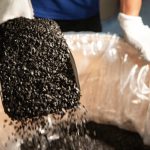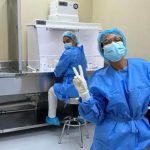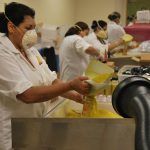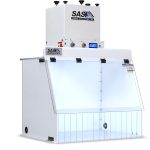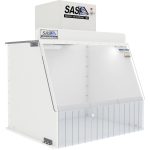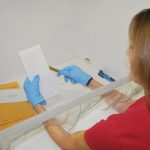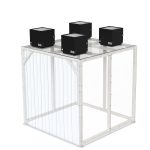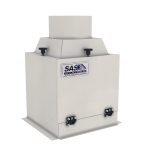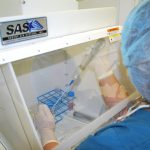By utilizing specialty-blended activated carbon filters, facilities can benefit from added adsorption rates aiding to improve operator safety and overall air quality. Certain chemicals such as formaldehyde are hard to filter using standard activated carbon filters. For these harder to filter chemical fumes, Sentry Air offers a variety of specialty-blended filter media. What are specialty-blended… Learn More
Proper IV Bag and Medication Preparation Can Help Save Lives
Utilizing an ISO Class 5 Cleanroom for IV bags and medication preparation aids in preventing medication contamination and can help protect patient safety. In the Dominican Republic, the Dominican Foundation for Mothers and Infants has installed three 40” IV Hoods or Portable Clean Rooms in the NICU of three different hospitals to improve their IV… Learn More
Improving Indoor Air Quality in Food Processing Facilities
In the food processing industry, monitoring indoor air quality (IAQ) plays a vital role in helping to prevent food contamination and preserving employee health. Poor indoor air quality in food processing or production facilities can lead to foodborne illnesses for consumers and occupational asthma for workers. Food processing facilities can benefit from improving indoor… Learn More
Deluxe Ductless Fume Hood (DCH2) Now UL-Certified
Sentry Air’s Deluxe Ductless Fume Hood aka DCH2 is now a UL-certified product. The DCH2 – Ductless Fume Hood Gen II underwent stringent testing by UL to ensure operator safety and product functionality. Who is UL? UL, Underwriters Laboratories, is a widely known non-profit organization that offers testing, inspection, and certification services to companies… Learn More
Portable Clean Rooms – Generation II – New Line from Sentry Air
Introducing Portable Clean Rooms – Generation II (PCR2). This system features an updated design that provides the operator with easy fan control, improved airflow, and efficiency. This line also offers larger sizes with the same dependability. Portable Clean Rooms – Generation II Updated Features Clean and Sleek Look The Portable Clean Room Generation II offers… Learn More
Mail Handling Safety: Engineering Controls for Minimizing Hazards
To minimize safety concerns, mail-handling procedures at private mailrooms should follow safety guidelines and implement engineering controls to minimize staff exposure to pathogens, particulate, and biohazards. On average, about 6,300 mail-borne incidents are reported every year to the Bureau of Alcohol, Tobacco, Firearms, and Explosives (ATF) and the U.S. Postal Inspection Service (USPIS) (Newman,… Learn More
New Product: Quick Ship Walk-in Hoods
Sentry Air Systems will now be offering off-the-shelf walk-in hoods or Quick Ship Walk-in Hoods. Quick Ship Walk-in Hoods ship in 5 business days instead of the industry standard 4-6 weeks+ lead time. With a few custom options, Quick Ship Walk-in Hoods provide a timely solution to help your facility start controlling fumes and particulate…. Learn More
Using Filtration to Help Address Common Exhaust Hood Issues – Exhaust Filter Box
Using Exhaust Hoods or Ducted Fume Hoods can lead to a variety of issues that affect the operation and safety of the fume hood. Below are a few common issues or concerns experienced with Exhaust Hoods. • Ductwork particulate build-up resulting in downtime and costly maintenance procedures (Haugen, 2018) • Safety concerns associated with ductwork… Learn More
Germ Killer UV Air Purifier – Powerful UV Air Cleaner to Help Reduce Disease Transmission
During the beginning of the COVID-19 pandemic, our product development team saw a need for an ambient air cleaner that used UV light to help prevent disease transmission. After extensive product and market research, we concluded that the UV air purifiers on the market had issues with UV light leaks and lacked safety features… Learn More
Help Prevent PCR Contamination with Laminar Flow Hoods
Polymerase Chain Reaction (PCR) requires strict laboratory protocol and procedures to prevent contamination and ensure accurate results (Rhea-McManus, 2022). PCR has revolutionized molecular biology and gene studies but recently became widely known for pathogen tests such as COVID-19 (Rhea-McManus, 2022). Laboratories should utilize Laminar Flow Hoods or Portable Clean Rooms for preparation and other sensitive… Learn More

 Made in the USA
Made in the USA
